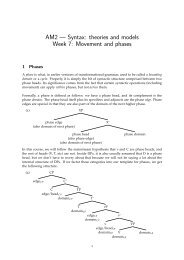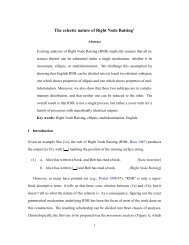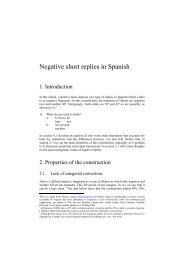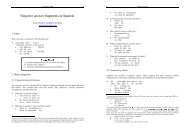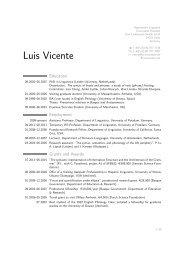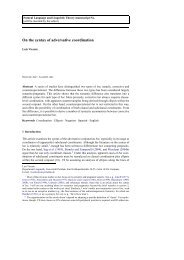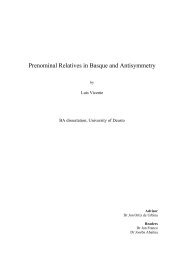Verb fronting in Mandarin Chinese - Luis Vicente
Verb fronting in Mandarin Chinese - Luis Vicente
Verb fronting in Mandarin Chinese - Luis Vicente
Create successful ePaper yourself
Turn your PDF publications into a flip-book with our unique Google optimized e-Paper software.
Cheng & <strong>Vicente</strong><br />
<strong>Verb</strong> <strong>front<strong>in</strong>g</strong> <strong>in</strong> Mandar<strong>in</strong><br />
UCSC L<strong>in</strong>guistics Colloquium<br />
October 31, 2008<br />
We are therefore left with the option of fusion with lian, which is always immediately adjacent to the<br />
leftmost copy of the verb. Note that the fact that lian is sometimes silent is not necessarily a problem,<br />
as <strong>in</strong> the German wh- doubl<strong>in</strong>g cases, the lower wh- word also fuses to a phonetically null C 0 .<br />
Why is doubl<strong>in</strong>g restricted to verbs?<br />
(44) a. ta lian zhe-ben shu dou kan-le (*zhe-ben shu)<br />
he lian this.cl book dou read.asp this.cl book<br />
“He read even this book”<br />
b. lian ta dou (*ta) kan-le<br />
lian he dou he read.asp<br />
“Even he read this book”<br />
zhe-ben<br />
this.cl<br />
shu<br />
book<br />
A related asymmetry: <strong>in</strong> German wh- doubl<strong>in</strong>g, only simple wh- words can be doubled.<br />
(45) German wh- doubl<strong>in</strong>g<br />
a. Wen glaubt Hans wen Jakob gesehen hat?<br />
who.acc th<strong>in</strong>ks Hans who.acc Jakob seen has<br />
“Who does Hans th<strong>in</strong>k that Jakob has seen?”<br />
b. * Wessen Buch glaubt Hans wessen Buch Jakob gelesen hat?<br />
which book th<strong>in</strong>ks Hans which book Jakob read has<br />
“Which book does Hans th<strong>in</strong>k that Jakob has read?”<br />
Nunes (2004) argues that fusion always takes bare heads (X 0 s) as its <strong>in</strong>put. If we assume that Mandar<strong>in</strong><br />
verbs qualify as bare heads, while DPs and pronouns are phrasal, the restriction of doubl<strong>in</strong>g to verbs<br />
follows.<br />
5.2 <strong>Verb</strong>al clefts<br />
In verbal clefts, the only constant element is the copula shi. However, shi cannot be the host of fusion<br />
because of the same reason as dou and negation above: some elements can <strong>in</strong>tervene.<br />
(46) a. kan shi xiang kan<br />
see cop want see<br />
“As for see<strong>in</strong>g, I will certa<strong>in</strong>ly see”<br />
b. kan shi yid<strong>in</strong>g kan<br />
see cop certa<strong>in</strong>ly see<br />
“As for see<strong>in</strong>g, I will certa<strong>in</strong>ly see”<br />
Besides, we observe an optional splitt<strong>in</strong>g effect with bisyllabic verbs, unexpected if double pronunciation<br />
here is a consequence of fusion.<br />
(47) a. ta xi shi xihuan<br />
he xi cop like<br />
“As for lik<strong>in</strong>g, he does like (it)”<br />
b. ta xihuan shi xihuan<br />
he like cop like<br />
“As for lik<strong>in</strong>g, he does like (it)”<br />
11 of 13



